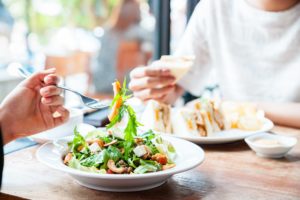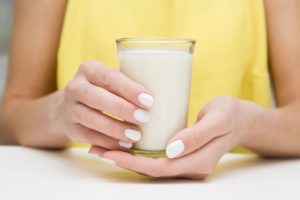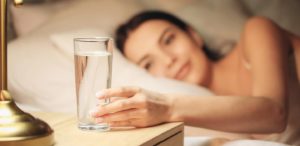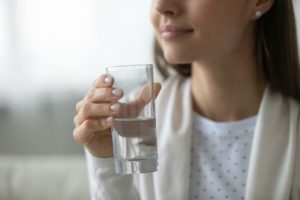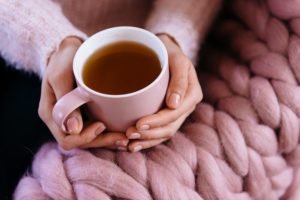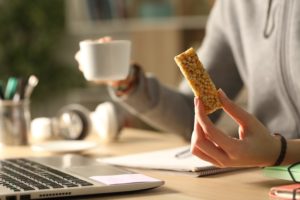Banana Tea: Recipe and Benefits for Sleep
Banana tea is a mildly sweet beverage made by steeping banana fruit, peel, or both fruit and peel in boiling water. After boiling for a few minutes, the tea is strained and ready to be consumed. Banana tea is said to contain many of the healthy nutrients found in bananas, including several that promote sleep.
Fortunately for those who want to try banana tea or to find out if it helps them sleep, this drink is easy to prepare at home. We discuss the nutrients in bananas and explain how they may help with sleep. We then provide three simple recipes for banana tea, including one using dried banana peels. Finally, we offer some tips for getting the most out of banana tea.
Are There Benefits of Banana Tea for Sleep?
While little research has been conducted on banana tea, it likely contains some of the same sleep-promoting nutrients found in raw bananas, including tryptophan, magnesium, and potassium. Because some of these nutrients are water-soluble, and because boiling can cause nutrients to leach into water, they are probably present in banana tea. That said, the quantities of nutrients and the effect of high temperatures on those nutrients is not known.
Drinking a warm, non-caffeinated beverage can be part of a relaxing bedtime routine that helps signal to the body that it is time for sleep. Moreover, research suggests that drinking certain beverages at night, such as chamomile tea and warm milk with honey, can improve sleep quality.
Tryptophan
Bananas contain tryptophan, an amino acid involved in the body’s regulation of sleep. When consumed, tryptophan undergoes transformation into serotonin and then melatonin, a hormone that signals to the body that it is time to sleep. Studies have found that eating tryptophan-rich foods can decrease the amount of time it takes to fall asleep and increase sleep duration.
Humans do not naturally produce tryptophan, so they must get it from food. While there are more tryptophan-rich foods available — including chicken, eggs, and beans — a medium banana contains about 11 milligrams of tryptophan, which is between 2.5% and 4.5% of a person’s recommended daily allowance.
Magnesium
Magnesium is a mineral involved in many of the body’s functions and processes. Although magnesium’s role in sleep is not fully understood, it may be important in maintaining human sleep cycles. According to one study, people with magnesium deficiency are less likely to get the amount of sleep they need at night. But research shows that magnesium supplements improve sleep , specifically in older people who experience insomnia.
Some experts think magnesium, like tryptophan, helps the body produce melatonin. And limited research suggests that magnesium may help reduce anxiety , which is known to interfere with sleep, However, more research will be needed to confirm these findings.
While not as rich in magnesium as spinach and nuts, bananas are a relatively good source of magnesium. A medium banana contains 31.9 milligrams of magnesium, about 8% to 10% of the recommended daily intake.
Potassium
Potassium is an electrolyte that serves many important roles in the body. Some research suggests that people, especially women, who do not get enough potassium have low quality sleep . Another outcome associated with insufficient potassium is muscle cramps or spasms. Leg cramps at night are common and can disrupt sleep, and getting enough potassium may help reduce or prevent muscle cramping at night.
Bananas are a good source of potassium, with a single medium banana providing around 12% to 16% of the daily intake considered nutritionally adequate for an adult.
Other Nutrients
Bananas also contain other important nutrients, including vitamin B6, manganese, and antioxidants. Although research exploring the connection between general nutrition and sleep is limited, some studies have found a positive relationship between a healthy diet — that is, one with plenty of fruits, vegetables, and grains — and good sleep.

How to Make Banana Tea
Banana tea may be made a few different ways. Some recipes call for only the soft inner fruit, while others incorporate the peel or use dried banana peel only. Although most people do not eat banana peels, they contain many nutrients, including magnesium and potassium. In fact, a banana’s peel contains more magnesium than the inner fruit. We include recipes for both options, as well as instructions for drying banana peels to be used in tea.
Also know that you can use bananas in various stages of ripeness for these recipes. The riper the banana, the sweeter your tea is likely to be.
Banana Tea Without Peel
- Peel a banana and cut the inner fruit into three or four pieces.
- Boil the fruit in 3 cups of water for three to five minutes.
- Strain out the banana pieces and pour the banana-infused water into a mug. Excess tea can be refrigerated.
Banana Tea With Peel
It is important to use an organic banana for this recipe to keep synthetic pesticides and fertilizers from getting into your tea.
- Thoroughly wash an unpeeled organic banana.
- Cut the ends off the banana, and then cut it in half, keeping the fruit in the peel.
- Boil the banana pieces in 3 cups of water for three to five minutes or until the banana begins to turn brown.
- Strain out the banana pieces, and pour the banana-infused water into a mug.
Banana Tea With Dried Banana Peel
This recipe calls for dried banana peels, which can be used like loose-leaf tea. Drying a batch of banana peels allows you to make banana tea even when you do not have fresh bananas on hand. Organic bananas should be used for this recipe.
- Take any number of organic banana peels and cut them into 1-inch square pieces.
- Dry peel pieces in a food dehydrator. Alternately, spread peels out on a baking sheet and bake them in an oven set to 160 degrees Fahrenheit for five to seven hours, or until the peels are completely dried out.
- When you are ready to make tea, boil one to two tablespoons of dried banana peels in two or three cups of water for three to five minutes.
- Strain and pour the banana tea into a mug.
Dried banana peels can be stored in an airtight container and used to make tea at your convenience. Discard dried peels after six months or if you see any signs of mold growth.
Tips for Making Banana Tea
If drinking banana tea becomes part of your evening routine, here are some tips to consider.
- Modify steep time: Experiment with boiling banana for up to 20 minutes for stronger tea.
- Save the boiled banana for later: If you make banana tea with the inner fruit, save the boiled fruit in your freezer for later use. Although boiled banana may not be particularly appetizing on its own, you can use it in baked goods or smoothies.
- Store unused banana peels in the freezer: After eating a banana, save the peel in a dedicated bag in your freezer instead of throwing it away. When the bag gets full, remove the peels and follow the steps for dehydrating banana peels to make dried banana peel tea.
- Add honey, cinnamon, or other spices: You may want to add spices like cinnamon, nutmeg, clove, or vanilla to enhance the flavor of banana tea. For more sweetness, consider including a spoonful of honey.
“If making tea is cumbersome, having the banana as a pre-sleep snack may be helpful, coupled with good sleep rituals.”
Dr. Abhinav Singh, Sleep Physician
If you are looking for sleep benefits beyond the comfort offered by a nightly cup of tea, you might consider simply eating a banana. This will ensure that you get all of the tryptophan, magnesium, potassium, and other nutrients that the fruit has to offer.
Additionally, research suggests that consuming carbohydrates alongside tryptophan helps more of the amino acid pass into the brain, where it is converted into the sleep-promoting hormone melatonin. Eating a banana will ensure you get about 23 to 31 grams of carbohydrates — more than drinking banana tea alone. Also, eating a banana will provide 100% of the fruit’s 3 grams of fiber, which is good for health and may also contribute to a good night’s sleep.
All of that said, if you like the flavor of bananas and enjoy winding down with a hot beverage at night, banana tea might be a nutritious and tasty addition to your bedtime ritual.

Still have questions? Ask our community!
Join our Sleep Care Community — a trusted hub of sleep health professionals, product specialists, and people just like you. Whether you need expert sleep advice for your insomnia or you’re searching for the perfect mattress, we’ve got you covered. Get personalized guidance from the experts who know sleep best.
References
6 Sources
-
Sejbuk, M., Mirończuk-Chodakowska, I., & Witkowska, A. M. (2022). Sleep quality: A narrative review on nutrition, stimulants, and physical activity as important factors. Nutrients, 14(9), 1912.
https://pubmed.ncbi.nlm.nih.gov/35565879/ -
Ikonte, C. J., Mun, J. G., Reider, C. A., Grant, R. W., & Mitmesser, S. H. (2019). Micronutrient Inadequacy in Short Sleep: Analysis of the NHANES 2005-2016. Nutrients, 11(10), 2335.
https://pubmed.ncbi.nlm.nih.gov/31581561/ -
Abbasi, B., Kimiagar, M., Sadeghniiat, K., Shirazi, M. M., Hedayati, M., & Rashidkhani, B. (2012). The effect of magnesium supplementation on primary insomnia in elderly: A double-blind placebo-controlled clinical trial. Journal of Research in Medical Sciences, 17(12), 1161–1169.
https://pubmed.ncbi.nlm.nih.gov/23853635/ -
Boyle, N. B., Lawton, C., & Dye, L. (2017). The effects of magnesium supplementation on subjective anxiety and stress – A systematic review. Nutrients, 9(5), 429.
https://pubmed.ncbi.nlm.nih.gov/28445426/ -
Li, M., Heizhati, M., Wang, L., Wang, Z., Abudoureyimu, R., Yang, Z., Pan, F., Sun, L., Li, W., Li, J., Lin, M., Gan, L., Lu, S., & Li, N. (2022). 24-hour urinary potassium excretion is negatively associated with self-reported sleep quality in the general population, independently of sleep-disordered breathing. Journal of Clinical Sleep Medicine, 18(11), 2589–2596.
https://pubmed.ncbi.nlm.nih.gov/35912683/ -
Hikal, W. M., Said-Al Ahl, H. A. H., Bratovcic, A., Tkachenko, K. G., Sharifi-Rad, J., Kačániová, M., Elhourri, M., & Atanassova, M. (2022). Banana peels: A waste treasure for human being. Evidence-Based Complementary and Alternative Medicine, 2022, 7616452.
https://pubmed.ncbi.nlm.nih.gov/35600962/


